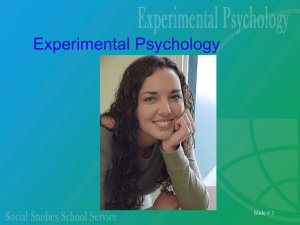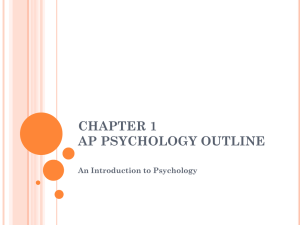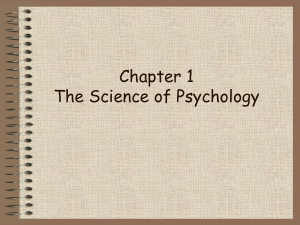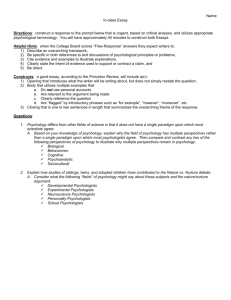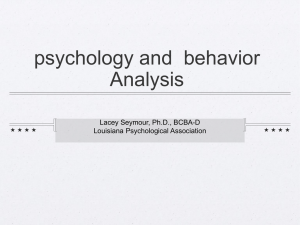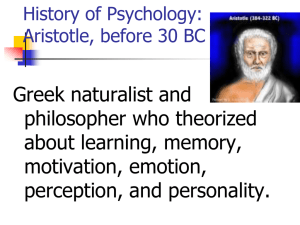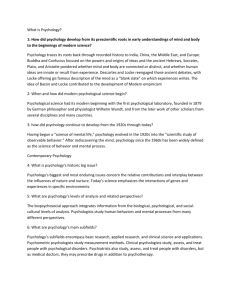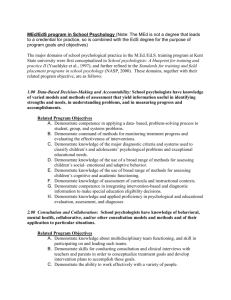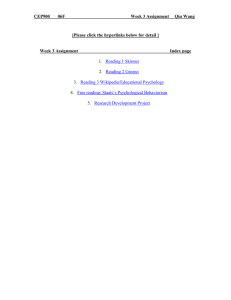Psychological Perspectives
advertisement
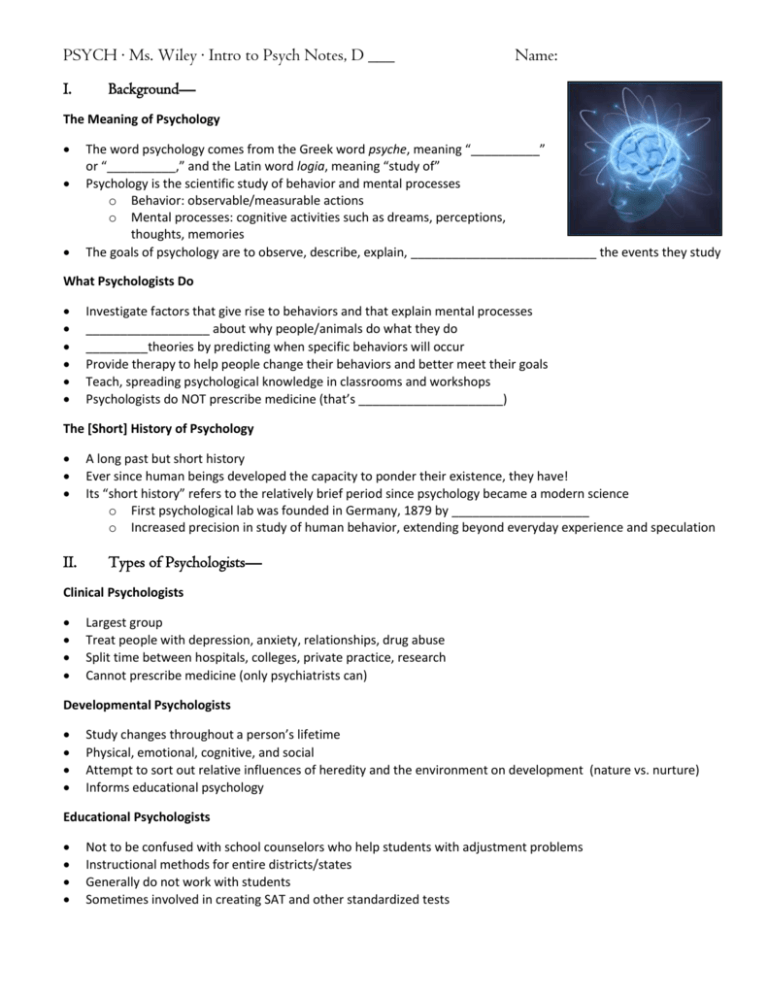
PSYCH ∙ Ms. Wiley ∙ Intro to Psych Notes, D ___ I. Name: Background— The Meaning of Psychology The word psychology comes from the Greek word psyche, meaning “__________” or “__________,” and the Latin word logia, meaning “study of” Psychology is the scientific study of behavior and mental processes o Behavior: observable/measurable actions o Mental processes: cognitive activities such as dreams, perceptions, thoughts, memories The goals of psychology are to observe, describe, explain, ___________________________ the events they study What Psychologists Do Investigate factors that give rise to behaviors and that explain mental processes __________________ about why people/animals do what they do _________theories by predicting when specific behaviors will occur Provide therapy to help people change their behaviors and better meet their goals Teach, spreading psychological knowledge in classrooms and workshops Psychologists do NOT prescribe medicine (that’s _____________________) The [Short] History of Psychology II. A long past but short history Ever since human beings developed the capacity to ponder their existence, they have! Its “short history” refers to the relatively brief period since psychology became a modern science o First psychological lab was founded in Germany, 1879 by ____________________ o Increased precision in study of human behavior, extending beyond everyday experience and speculation Types of Psychologists— Clinical Psychologists Largest group Treat people with depression, anxiety, relationships, drug abuse Split time between hospitals, colleges, private practice, research Cannot prescribe medicine (only psychiatrists can) Developmental Psychologists Study changes throughout a person’s lifetime Physical, emotional, cognitive, and social Attempt to sort out relative influences of heredity and the environment on development (nature vs. nurture) Informs educational psychology Educational Psychologists Not to be confused with school counselors who help students with adjustment problems Instructional methods for entire districts/states Generally do not work with students Sometimes involved in creating SAT and other standardized tests Specialists Environmental psychologists o Ways in which people influence and are influenced by physical environment o Why do crowded cities make some people cranky? Consumer psychologists o Study behavior of shoppers to explain/predict behavior o Why is milk furthest item in store from front door? Forensic psychologists o Testify about the competence of defendants Social Psychologists Concerned with behavior in social situations Conformity and obedience Physical and psychological factors that attract people to one another How people’s behavior changes when they are members of a group Situations in which people help others Bystander effect 1. What kind of psychologist would you like to be? Why? 2. Summarize videos (2) on the “bystander effect” and include your reactions: III. Psychological Perspectives (5)—(Biopsychology, Psychoanalysis, Behaviorism, Humanistic, Cognitive) Biopsychology / Neuroscience Emphasizes role of biology on behavior and mental processes Studies the organization of the __________________________________________________________ How does damage to parts of brain affect personality, ability to learn, etc.? Research methods: o Brain scans o Monitoring blood flow 3. Summarize video on Phineas Gage: Psychoanalytic Perspective Founded by ____________________________ Focuses on the __________________________ and its influence on human behavior Most feelings come from the “hidden place” in the mind (iceberg theory) We protect ourselves from our real feelings by repressing them and are often not consciously aware of them People must gain insight into their unconscious conflicts, particularly those that are sexual and aggressive, in order to “get better” Behaviorism Investigates observable behavior How does learning create and change behavior? Began in 1913 with _________________________ o Rebelled against introspection and studies of consciousness o Psychology should focus on objectivity Behaviorists believe that almost everything a person does is influenced by _______________________________ John B. Watson (Behaviorism Continued) Give me a dozen healthy infants, well-formed, and my own specified world to bring them up in and I'll guarantee to take any one at random and ________________ to become any type of specialist I might select – doctor, lawyer, artist, merchant-chief and, yes, even beggar-man and thief, ____________________of his talents, penchants, tendencies, abilities, vocations, and race of his ancestors. Classical Conditioning (Behaviorism Continued) Occurs when a _____________________________________, through association with an unconditioned or automatic stimulus, thereby develops capacity to elicit certain emotional or physiological response Little Albert: o Previously neutral stimulus: rat o Unconditioned/automatic stimulus: fear at loud noise o Conditioned response: fear of __________, which had been __________ with loud noise 4. Summarize video on the Little Albert experiment and include your reactions: Pavlov’s dogs: (Ivan Pavlov, 1927) o Previously neutral stimulus: buzzer o Unconditioned/automatic stimulus: salivate when see food o Conditioned response: salivate at ____________ after buzzer is paired with food 5. Summarize video on Pavlov’s dogs: 6. In your own words, summarize what “classical conditioning” means: Operant Conditioning (Behaviorism Continued) How consequences lead to changes in voluntary behavior We learn through consequences and reinforcers Behaviors tend to appear, disappear, or become modified according to their __________________________ Resists the mind as the _____________________ in human activity, instead consequences in environment was influential agent Pioneered by _________________: o “The real question is not whether machines think but whether men do.” 7. How does the clip from the “Big Bang Theory” highlight the principle of operant conditioning? Humanistic Perspective Emphasis on inborn potential for favorable growth, self-healing, recovery Believes that human beings possess an inborn capacity for fulfillment Whether environment is favorable or adverse, there is an automatic striving in life towards __________________ and improvement _________________________: our predisposition to seek the fullest expression of our abilities and thereby achieve meaningful goals Self-Actualization Cognitive Psychological Physiological Seeks to understand: How people express and experience their uniqueness ___________________: all of the ideas, feelings, perceptions recognized as me, I or myself; how people view themselves ___________________: standards of excellence prescribed for oneself Self-esteem: overall evaluation of oneself What constitutes happiness and life satisfaction A greater understanding of human happiness and how to foster its presence Abraham Maslow was the first to explain the stages people go through during the actualization process: Maslow’s Hierarchy of Needs—Path to Self-Actualization Self-actualization Fulfillment of drives ____________________ basic biological or psychological needs Individual pursues whatever constructive activities he/she is best ____________________ Examples: MLKs, Lincolns, Mother Teresas Cognitive awareness and To know and understand beauty, nature, and the complexity of the human understanding condition _____________________________________________ Psychological motives Need for ____________________________________________ Need for self-esteem, confidence, respect Employment, stability, friendship Physiological motives Need for _____________________ oxygen Safety, freedom from harm See ‘Self-Actualization Inventory’ document. Cognitive Perspective Sensation and perception: o How senses respond to stimulation o How perceptions are formed Processes in memory: o How do people store memories/info o How people ________________ information o Why people ________________ Thought: o How we reason and problem solve Language: o How language is _________________ On Not Forgetting (Cognitive Perspective Continued) ___________ forgetting by: thinking and transforming content in a special, genuine way Organizing systematically: o Graphic organizers, clear notes and visual aids Chunking it with similar items: o Cut down on items to remember by grouping into lesser items Cueing it: o Forming _________________________ o Signal/reminder for retrieval Rehearsing it: o Repeat, practice Language Acquisition (Cognitive Perspective Continued) By end of 1st year, most have gone from cooing/babbling to minor word recognition End of 2nd year, words appear in combination with typical errors Ages 2-6, most children increase their vocabularies by approximately 10 words a day Key finding: o Language is _______________________________________________________________________ Thought Acquisition (Cognitive Perspective Continued) IV. Memory starts to develop around 2nd year o Gain images for thinking about things not in the present Cannot yet think logically until around 5 (______________________________) By age 6, realizes beakers are the same o Understands ________________ operations but not hypothetical situations Age 11, can understand abstract Teen years, can test hypotheses Review— 8. In your own words, describe what psychology is and some of the things psychologists seek to do: 9. In your own words summarize each psychological perspective: PERSPECTIVE DESCRIPTION (in own words) 10. Generate a list of at least three questions you have about the material discussed in this document:
